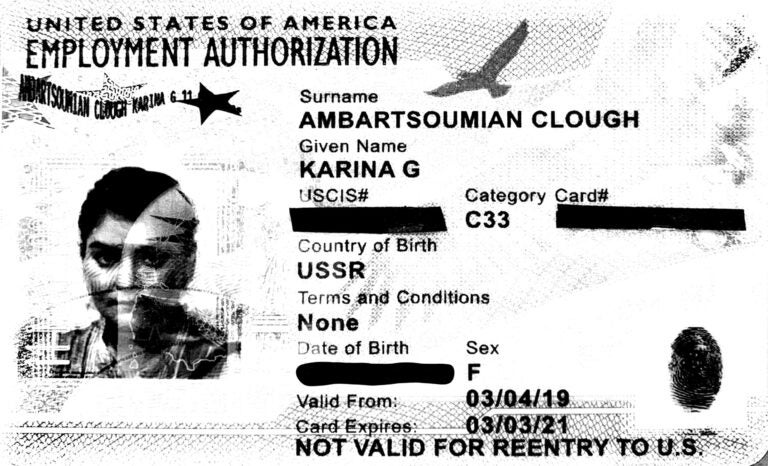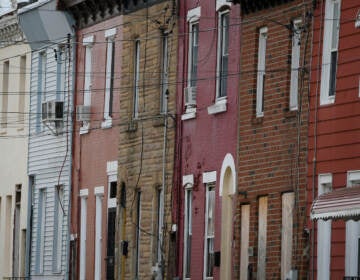The future is uncertain for stateless people like me
Karina Clough, a stateless person and a DACA recipient under final removal proceedings, wants meaningful immigration reform. And she and others want it now.

Karina Gareginovna Ambartsoumian-Clough's employment card. (Courtesy of Karina Gareginovna Ambartsoumian-Clough)
I was born in a country that no longer exists. The country that replaced it does not recognize me as a citizen and the country I am living in does not have a legal framework to help people like me.
My name is Karina Gariginovna Ambartsoumian-Clough. I am a stateless person and a DACA recipient under final removal proceedings. I am married to a US-born citizen but even so, I have no path to citizenship—because I am stateless and DACA does not provide a path to citizenship.
Article 1 of the 1954 Convention in Relation to the Status of Stateless Persons defines a stateless person as someone “who is not recognized as a national by any state under the operation of its law”. According to the Center for Migration Studies there are an estimated 218,000 non-US citizen residents who are potentially stateless or potentially at risk of statelessness in the United States across all 50 states.
Spanning the globe, the stateless population in the United States includes people from 32 countries and territories with diverse races, ethnicities, and religions who may be stateless owing to discriminatory citizenship laws where they are born.
As a stateless person in the United States, I do not have citizenship in any country in the world. My statelessness even prevents my US-born husband from using his rights as a citizen to petition for his non-citizen wife to obtain a green card. Without a nationality or legal status, it has been nearly impossible for me to gain access to identification and employment. Thankfully, DACA provides me access to these basic human rights. Yet, the past eight years have proven that two very different administrations are willing to use DACA recipients as political bargaining chips. Being used this way prevents me from establishing any sort of confidence that any administration is willing to prioritize meaningful immigration reform that includes recognition for stateless people in the United States.
The DACA program is not secured from future attempts to rescind it and without protections in place in the form of established law, the Department of Homeland Security can easily target DACA recipients for removal. As stateless people on DACA, we are vulnerable to losing access to identification and being subjected to prolonged detention because we typically do not have access to travel documentation. Depending on the stateless person’s country or territory of origin, it is common that the country or territory either does not exist, would not issue a travel documentation and/or would not recognize that person as a citizen. This puts stateless people in a situation where they cannot be deported.
While I am grateful for the Supreme Court decision, I know that under current law, the future for DACA is not protected even though the program provides only a bare minimum toward the basic human rights to self identify and legally work in the United States. I am confident that there will be further attempts to end this program under the current or future administrations. I have yet to see any leading political platform that acknowledges stateless rights or sufficiently extends and protects DACA to provide a path to citizenship.
While protecting DACA and ensuring it provides a path to citizenship would help me and other stateless people with DACA, we need specific solutions to ensure all stateless people in the United States have access to their basic human rights. Although, the recommended solutions for the stateless in the United States exist and are laid out in the 2013 UNHCR-USA and Open Society Foundations report:Citizen of Nowhere: Solutions for the Stateless in the United States. The report gives specific suggestions for each branch of government and departments to alleviate this human rights crisis.
Most importantly, US allies like the United Kingdom and France have implemented a stateless legal framework to protect and include stateless people. Simply, the solutions and resources exist for comprehensive immigration reform but there is lack of implementation in the United States. The proposed Refugee Protection Act of 2013 includes a provision that would allow qualifying stateless people to apply for legal status in the United States, but the bill’s advocates have been unable to move it forward towards law.
Hannah Arendt once said that the right to have rights, or the right of every individual to belong to humanity, should be guaranteed by humanity itself and I ask the United States government, elected officials and the American people, is the combined humanity of the estimated 700,000 DACA recipients and the 218,000 stateless people enough?

Karina Gareginovna Ambartsoumian-Clough resides in Philadelphia, PA with her husband and is a founding member of United Stateless, a stateless-led national organization with a mission to build community among those affected by statelessness and advocate for their human rights.
 WHYY is one of over 20 news organizations producing Broke in Philly, a collaborative reporting project on solutions to poverty and the city’s push towards economic justice. Follow us at @BrokeInPhilly.
WHYY is one of over 20 news organizations producing Broke in Philly, a collaborative reporting project on solutions to poverty and the city’s push towards economic justice. Follow us at @BrokeInPhilly.
WHYY is your source for fact-based, in-depth journalism and information. As a nonprofit organization, we rely on financial support from readers like you. Please give today.




